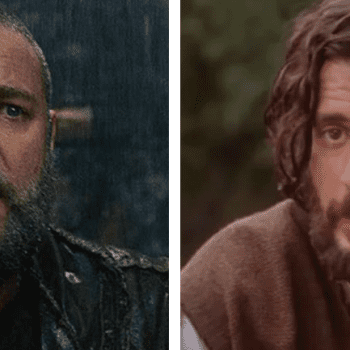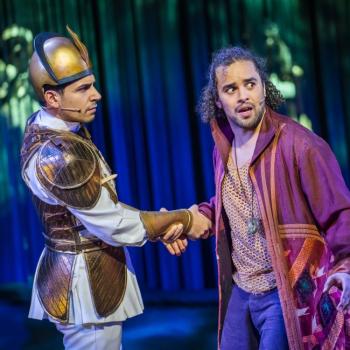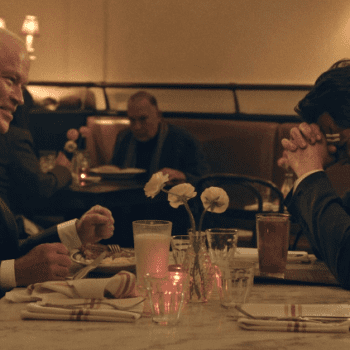Last year I wrote an essay on films about Abraham, Isaac, Jacob and Joseph — the patriarchs of Genesis — for an upcoming book called The Bible in Motion: A Handbook of the Bible and Its Reception in Film (current release date: July 15). As research for that essay, I watched a lot of movies based on Genesis, but I only had so much time at my disposal, and I couldn’t watch everything that came my way.
This was especially true of Yousuf e Payambar, a.k.a. Prophet Joseph, a 45-episode series about the life of Joseph produced for Iranian television about eight or nine years ago. I was intrigued by the series, especially when I found multiple versions of it floating around YouTube and other websites, but I couldn’t justify watching roughly 35 hours of footage just to beef up one or two paragraphs in my essay.
I have a little more time now, though, and since I have done weekly episode recaps of series like A.D. The Bible Continues and Of Kings and Prophets, I thought it might be interesting to take a similar look at Prophet Joseph — but since there are so many episodes, I plan to look at two each week, instead of just one. I don’t mind doing this over the course of five or six months, but almost a year? That’s a little much.
As noted, every episode is available online in multiple formats, and I will embed them at the bottom of each post. Different versions vary in length — I notice that the English-dubbed Episode 2 is lacking the last few minutes of the subtitled Episode 2, for example — but I obviously don’t have time to do scene-by-scene comparisons of every episode. Suffice it to say that my recaps will be based on the subtitled versions of each episode, because I prefer to hear foreign films in their original languages.
So, here goes: the first two episodes of Prophet Joseph.
Synopsis. The first episode takes place in “Faddan-aram, a city located in the south of Babylon.” Jacob has been living here for some time and already has his two wives and two concubines; he also makes a point of preaching against the foolishness of idolatry and telling people to worship the God of his grandfather Abraham. The priests of Ishtar arrest those who listen to Jacob but are reluctant to punish Jacob himself, because his father-in-law Laban is the local governor. Things come to a head when Jacob’s pregnant wife Rachel goes into labour and falls unconscious: Laban calls on the priestess of Ishtar to come save his daughter, but Jacob sends the priestess away, saying the priestess’s “imagination” will be useless here — and so the fate of Rachel becomes a test to see whether Ishtar or Jacob’s God is the more powerful deity.
The second episode begins with Jacob praying through his tears and asking God to save Rachel and prove the superiority of monotheism over polytheism. Sure enough, a light shines down — even though it is basically midnight — and Rachel wakes up and finally gives birth to Joseph. Meanwhile, the priestess who has been praying for Rachel’s death in Ishtar’s temple knocks over a brazier and sets the temple on fire, killing herself in the process. The locals, including Laban, all promise to believe in Jacob’s God from here on. Five years later, a messenger arrives from Canaan with news that Jacob’s father Isaac has died, so Jacob decides to return to Canaan with his family — but en route, Rachel goes into labour again, and this time she dies.
Differences from Genesis. I don’t know whether this comes down to translation issues or an actual divergence between the Jewish and Muslim traditions, but the biblical Laban and his family lived in Paddan Aram, a region northwest of Babylon — near the northern edge of the Fertile Crescent — and nowhere near Babylon or southern Mesopotamia. Laban does not hold any sort of political office in Genesis.
There is a strong tendency in Muslim films about biblical figures to make the saints and prophets seem holier than they appear in the Bible; to what degree this is intrinsic to the Muslim faith and to what degree it reflects the piety of the filmmakers, I could not say. But whatever the reason, there is no sense in these episodes of Jacob as the trickster that Genesis makes him out to be. The biblical Jacob moved to Paddan Aram to flee his justifiably outraged brother Esau, after tricking their father into giving Jacob the blessing that had been meant for Esau — but there is no mention of Esau at all in this series so far. (Instead, we are told that Jacob has a sister.) And the biblical Jacob and his wives were engaged in a constant battle of wills with Laban — Jacob used sneaky folk magic to make his flocks stronger than Laban’s, and Rachel stole Laban’s household gods when the family left for Canaan without telling Laban — but in the film, Jacob lets everyone know he is going home, and Laban spontaneously gives Jacob half his flock as a reward for years of faithful service. (And of course, there is no mention of Laban’s household gods: the entire family is monotheistic now.)
Jacob does acknowledge that Laban got Jacob to marry Leah rather than Rachel first, but in a way that suggests it was no big deal: older sisters have to get married before younger sisters, after all. And this points to another curious thing about the film, i.e. the way characters laugh off the tensions that drive the story in Genesis. Jacob’s concubines are jealous of the attention he gives to Rachel, yes, but this is apparently meant to reflect badly on them, not him — and Rachel’s sister Leah seems to be smiling when she tells her five-year-old nephew/stepson Joseph that she and Rachel both gave Jacob concubines (i.e. they ordered their servants to have sex with their husband) because they were “competing” for Jacob’s “kindness”. (Needless to say, the competition between the sisters looks more dysfunctional in Genesis 29-30.)
The biblical Isaac did not die until some years after Jacob had returned to Canaan and Joseph had been sold into slavery by his brothers. (See the timeline here.)
Believably human. While I’m not a fan of overly pious interpretations of these stories, I do appreciate the way the filmmakers inject what humanity they can into the proceedings. The grateful smiles that Jacob and Laban give each other when they hear that Rachel has survived the birth of Joseph is one such grace note. I also felt the grief of Jacob and Joseph when Rachel dies, in a way that I don’t recall feeling it while watching other films; perhaps that’s because Rachel’s death tends to take place after most films about Jacob have ended and before most films about Joseph have begun. It’s also quite striking how different people file into the tent where Rachel has died and proclaim their attachment to her: “My sister,” says Leah; “My mistress,” says Bilhah; “Aunt Rachel,” says Jacob and Leah’s daughter Dinah. And if I’m not mistaken, while these people all mourn Rachel’s passing, Leah’s handmaid Zilpah — one of the two jealous concubines — just stands there and watches, silently.
God versus the gods. Interestingly, Jacob already has a “holy book” in his hand when he preaches to the people of Faddan-aram: What does it contain? Who wrote it? (Keep in mind that this story takes place right in the middle of the very first book of the Hebrew Bible: none of its books had been written yet.) Jacob acknowledges that some babies have gotten better after their parents prayed to Ishtar, but he says this is because the true God showed mercy on them anyway. Everyone debates whether Jacob and his blasphemies have been good or bad for Faddan-aram: the priests of Ishtar blame the current drought on Jacob (and one worshiper says he’s ready to kill Jacob and his family if the crops die), but Laban says Jacob has brought an increase to his flock. The people are fed up with the priests of Ishtar and are clearly ready for a change in religion, but it takes the miraculous healing of Rachel — accompanied by the drought-ending rain — to make them jump ship. Interestingly, although it is hinted that the priests in Babylon would not be happy with Jacob’s blasphemies or with Laban’s toleration thereof, there is no hint whatsoever that the folks back in Babylon have even heard about the destruction of the Ishtar temple in Faddan-aram when the film jumps ahead five years. Speaking of which, it is quite striking how, when the film jumps ahead five years, the first thing we see is a shot of some children — Jacob’s perhaps? — playing in and around the temple ruins. That building was a sacred space once, to some, but now it’s just another pile of sticks and stones.
Foreshadowing. Rachel is bothered by the sight of Jacob’s older sons playing rough with one another. Jacob shrugs it off and says the boys are just testing their strength because they think whoever’s the most powerful will be Jacob’s successor. Jacob then reminds his sons that physical strength isn’t everything, and that their ancestors Abraham and Isaac were the noblest of men, rather than the strongest. All of this, presumably, foreshadows how Jacob’s sons will ultimately turn against Rachel’s son long after she is gone — and how Joseph will be noble just like his ancestors.
Timeline issues. An opening subtitle says the story begins in 1160 BC. This is much, much later than most historians would place the lives of Jacob and Joseph (to the degree that they would grant any historicity to these stories at all). Indeed, it is later than most historical estimates for the Exodus, which took place several generations after Jacob and Joseph had moved the entire Israelite clan into Egypt.
Rachel has apparently been waiting for a child for “11 years” when Joseph is born. But when Joseph is 5 years old, Jacob and Rachel take him to the well where they first met and tell him that they met 15 years ago — and that Jacob didn’t marry either Leah or Rachel until after he had worked for Laban for 7 years. Something here doesn’t add up — was Rachel waiting to have a child a year before she and Jacob had even met? was she waiting to have a child before she and Jacob had actually married? — but this could be a translation problem rather than a problem with the original script. In any case, Genesis 31 indicates that Jacob stayed with Laban for 20 years altogether.
Theological issues. The second episode begins with Rachel being saved from death miraculously as she gives birth to Joseph, and it ends with her dying as she gives birth to Benjamin. If her salvation at the beginning of the episode was a sign of God’s power, how are we to understand her death at the end of the episode? Why did God intervene in one case and not in the other? Simply because pagans were watching the first time but there were no pagans around the second time? I am curious to see if questions like these are addressed by the characters in future episodes.
Ties to other traditions. Farez, one of Jacob’s earlier converts, is arrested by the priests and condemned to be tossed into a fire from a sort of vertical platform. Jacob remarks that this is what King Nimrod once did to his grandfather Abraham — and as it happens, that incident is also depicted in a film from Iran called Abraham, the Friend of God, which I saw as part of the research for my essay last year.
–
Episodes: 1-2 | 3-4 | 5-6 | 7-8 | 9-10 | 11-12 | 13-14 | 15-16 | 17-18 | 19-20 | 21-22 | 23-24 | 25-26 | 27-28 | 29-30 | 31-32 | 33-34 | 35-36 | 37-38 | 39-40 | 41-42 | 43-45
–
Here is the subtitled version of the first two episodes (and the third):
And here are the English-dubbed versions:













